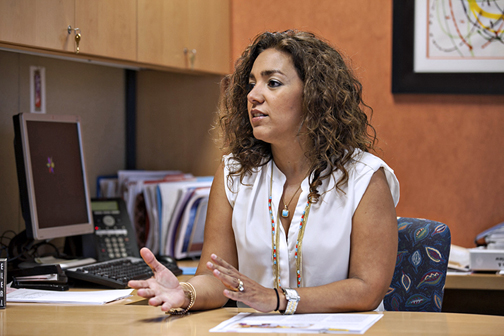New government taxes scaring off entrepreneurs


Vivien Montañez-Fernández, senior vice president and division manager of business banking at Banco Popular.
Uncertainty over the impact of new taxes on businesses may be putting a break on entrepreneurship with Puerto Rico’s largest bank reporting a slowdown in its small business loan activity.
“Clients who had already brought in loan requests, which we were working on, have asked us to put them on hold while they check their tax impact,” said Vivien Montañez-Fernández, senior vice president and division manager of business banking at Banco Popular.
She was referring to two of several new taxes to boost treasury revenue that will have a direct impact on startups: the business-to-business tax and the sales and use tax (IVU by its Spanish acronym) on commercial banking transactions.
As the island’s business sector readies to take on this new taxation, would-be-entrepreneurs have been left wondering what effect it will have on the operational costs of their fledgling startups, an additional cost that must be factored in on top of the troubled economic scenario in which all businesses are operating.
“Those two components are going to have an effect on the operational costs of any business and while at the beginning they will try to avoid passing it on to the consumer, eventually they will not be able to absorb it,” she said.
Hence the wait-and-see attitude that has developed among entrepreneurs.
The slowdown, according to Montañez, started in July following two quarters in which the bank increased its loan disbursements despite experiencing a drop in loan applications.
Between January and September, the bank approved 1,500 small business loans of less than $500,000, for a total value of $40 million. This figure does not include refinancing and restructuring of loans nor increases to loans and lines of credit.
“One thing is what I approve and another is for that approval to become a real loan and the client to finally get their money,” she said. “New money disbursements on loans to commercial customers are 13 percent higher than last year.”
But with the slowdown now in place, Montañez said it is unclear at this time whether the bank will end up the year with more disbursements or a flat performance.
Although Banco Popular gives out small business loans as high as $500,000, the average amount for 60 percent of these loans is $50,000. Montañez noted that the U.S. Small Business Administration guarantees 25 percent of the bank’s small business loans while other collaterals, such as personal property, guarantee the remaining 75 percent. Delinquency, she said, has been controlled and is currently stable.
Food startups lead the way
What kinds of businesses are being started these days? Montañez said food is a popular area, with startups including bakeries, cafeterias and small, family-type restaurants that offer affordable pricing and distinctive food. Professionals are setting up consulting firms to provide services to clients in such areas as engineering, law, and medicine. In the medical sector, startups also include pharmacies, she said.
Although the construction sector remains at a standstill, contractors are making a modest comeback. Whereas in the past they tackled large projects, contractors are taking out loans to work on small projects such as home remodeling.
“We’ve seen some growth in loan requests in this area,” said Montañez.
Entrepreneurs turning to Banco Popular for financing are “better prepared and positioned to apply for credit” in a scenario of increased local and federal regulations, making it easier for the bank to assess their loan requests, according to Montañez. If all the paperwork is in order, a loan can be approved as fast as within 48 hours. The rate of approval is 54 percent.
Even in these tough times, Montañez said, “there is enthusiasm for starting a business.” She described the current crop of entrepreneurs as practical people ready to make changes when a business is not working out or, in the event of failure, reinvent themselves and start something totally different.
Keeping costs down is a priority, she said. Instead of starting out big, entrepreneurs are choosing to start small and built up as they go along. For example, instead of renting out an office, an entrepreneur may choose to work out of the home.
“They are being more cautious in how they establish a business and in not incurring big operational costs,” she said. “That did not happen 10 years ago. The economy bet that businesses would grow but with all the hard knocks business people are now more cautious.”














There are 2 other reasons businesses are running scared.
Who, in their right mind, wants to go through the circus of
permits the island requires? Even more importantly, who with
half a brain wants to say they’re thinking of building something.
The minute anyone says that, everybody who has absolutely
nothing to loose, starts the drumbeat of environmental protests.
Hopefully, they’ll like climbing up palm trees to get food because,
at this rate, everytime they start with the “save the environment”
routine, they’re cutting off any chances they have of creating
their own prosperity. Some environmentalists also show great
ignorance because there can be development that is ecologically
sound. However, all the first words seem to be, “No.”
Without investors, who exactly do you think is going to pay for
your entitlements? Surfrider? Great. Ask them for food, clothing,
or money to pay your utility bills. Good luck with that! Hopefully,
someone, somewhere in Puerto Rico, will know enough to see
that they’re pawns, being used, themselves.